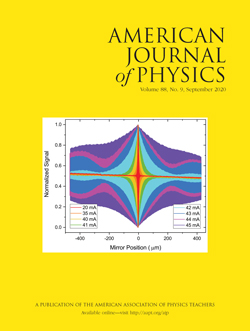 September 2020 Issue,
September 2020 Issue,
Volume 88, No. 9
We use a Michelson interferometer to explore the spectroscopic properties of laser diode emission over a wide range of operational conditions. By studying how the interferogram changes with drive current, we demonstrate the relationship between coherence length and spectral bandwidth. At low injection current, the laser source operates more like an ordinary light-emitting diode (LED), generating a relatively broad spectrum with short coherence length. In contrast, when the drive current exceeds the single-mode lasing threshold, we obtain a steady sinusoidal interferogram throughout the movable mirror scanning range, indicative of monochromatic light. At intermediate injection, we observe a beating pattern due to the presence of multiple longitudinal lasing modes. We verify that the beat distance, or optical travel between beats, is consistent with the spectrally validated mode spacing.
EDITORIAL
Editorial: In this issue: September 2020, by Beth Parks. DOI: 10.1119/10.0001691
PAPERS
Electromagnetic radiation and the self-field of a spherical dipole oscillator by Masud Mansuripur and Per K. Jakobsen. DOI: 10.1119/10.0001348
The paradox of the tight spiral pass in American football: A simple resolution by Richard H. Price, William C. Moss and T. J. Gay. DOI: 10.1119/10.0001388
Multiple approaches to incorporating scattering states in non-degenerate perturbation theory by Don C. Colladay and John Eric Goff. DOI: 10.1119/10.0001428
Plasma waves in a different frame by A. Macchi. DOI: 10.1119/10.0001431
A first-year research experience: The Freshman Project in Physics at Loyola University Chicago by Jonathan Bougie, Asim Gangopadhyaya, Sherita Moses, Robert D. Polak, Gordon P. Ramsey and Weronika Walkosz. DOI: 10.1119/10.0001611
Laser diode coherence by Tim Gfroerer and Morgan Bergthold. DOI: 10.1119/10.0001487
Numerical and analytical study of the bound states of the −α/x2 potential by Thanh Xuan Nguyen and F. Marsiglio. DOI: 10.1119/10.0001533
NOTES AND DISCUSSIONS
Comment on “A computer model of classical rolling friction” [Am. J. Phys. 87, 720–728 (2019)]
INSTRUCTIONAL LABORATORIES AND DEMONSTRATIONS
An asymmetrical double torsion pendulum for studying coupled harmonic motion by Yuntian Wang, Xintong Duan, Mingzhen Shao, Cailin Wang and Huan Zhang. DOI: 10.1119/10.0001613
COMPUTATIONAL PHYSICS
Weyl's problem: A computational approach by Isaac Bowser, Ken Kiers, Erica Mitchell and Joshua Kiers. DOI: 10.1119/10.0001657
BOOKS RECEIVED
American Journal of Physics 88, 784 (2020); https://doi.org/10.1119/10.0001679
American Journal of Physics 88, 784 (2020); https://doi.org/10.1119/10.0001502
About AJP
General Information, Resources for Authors, Reviewers, and Readers

